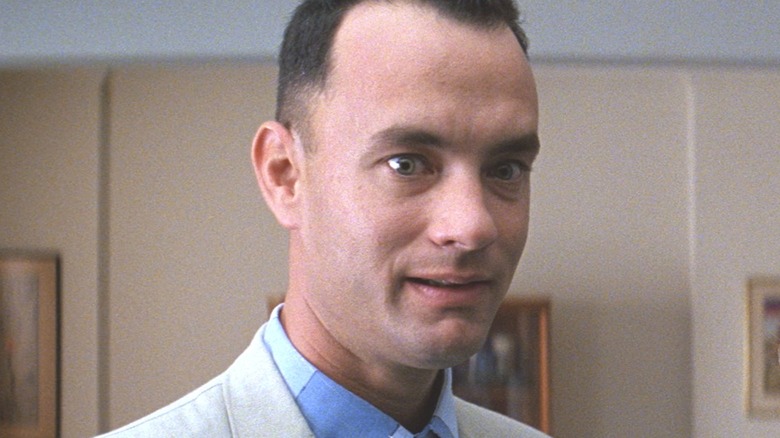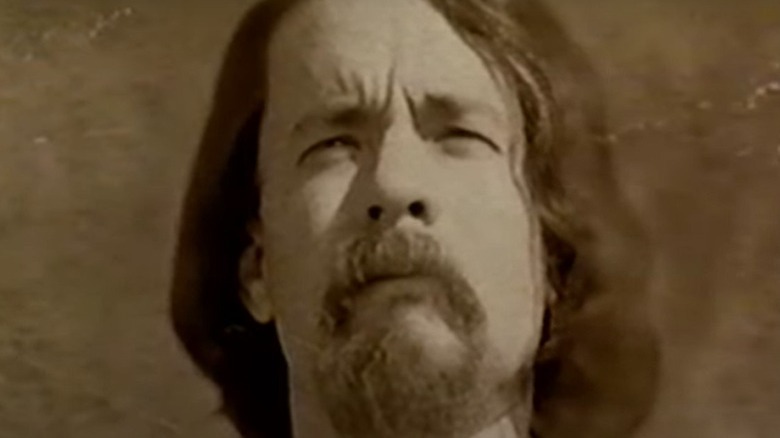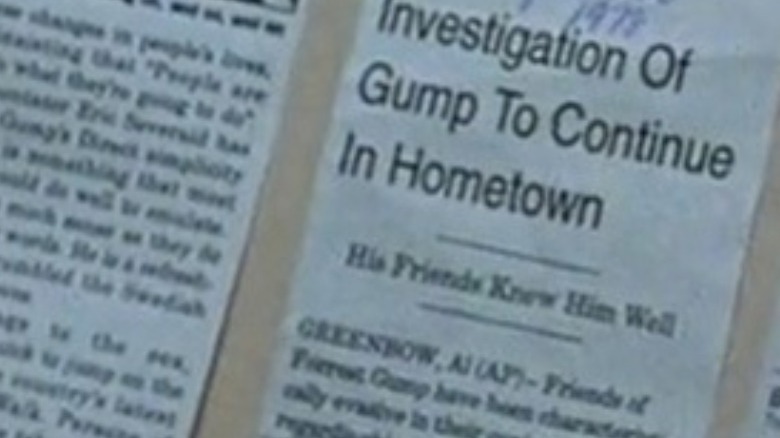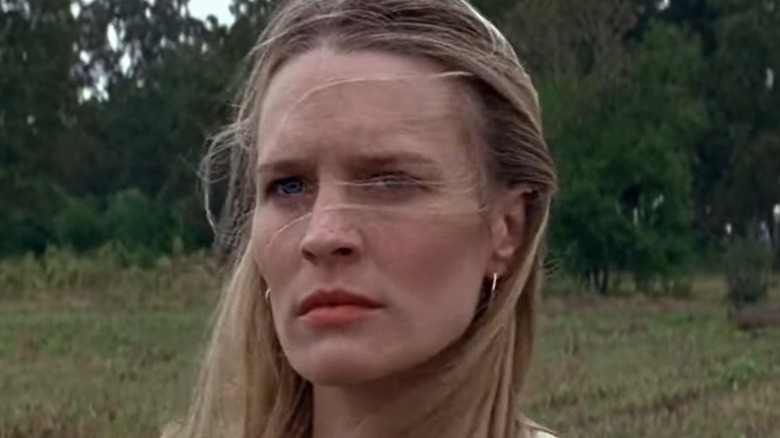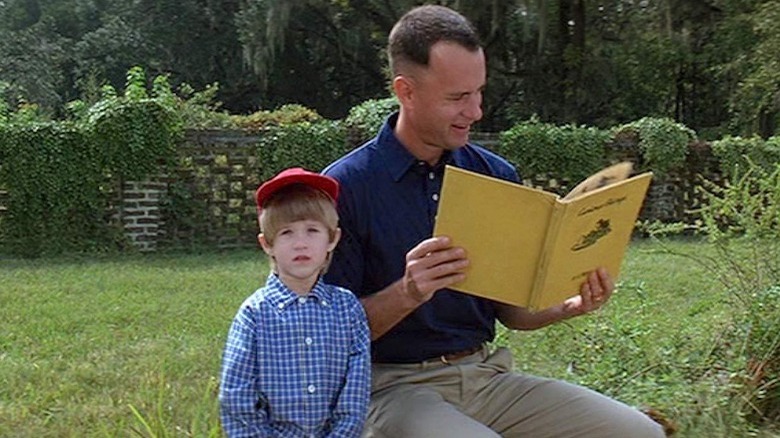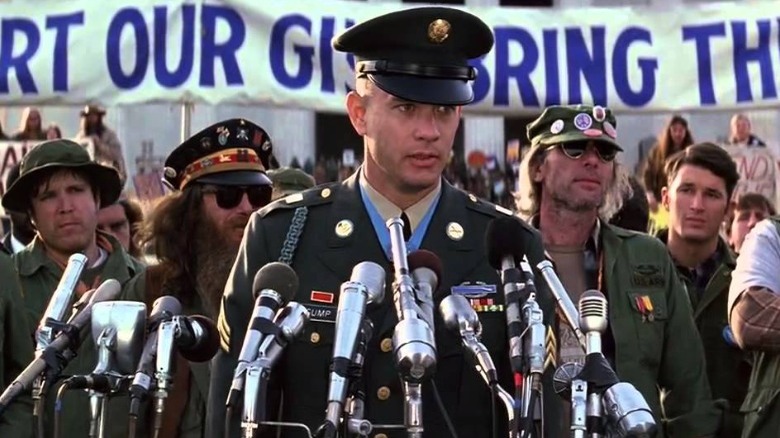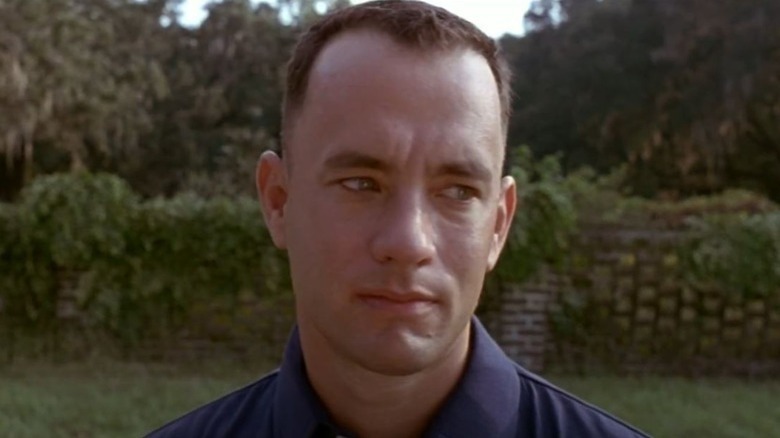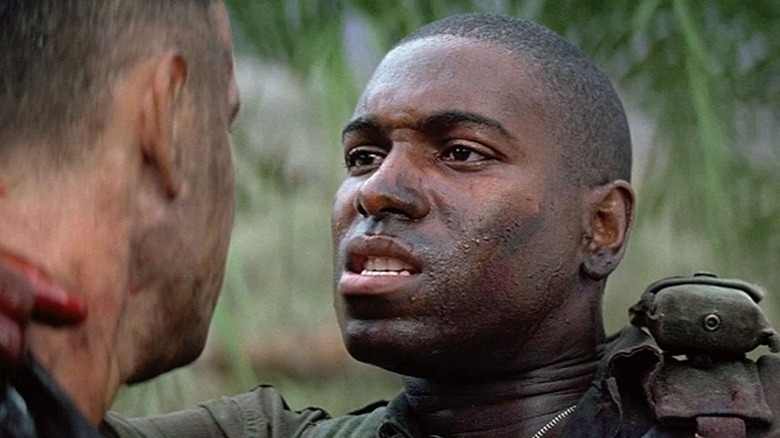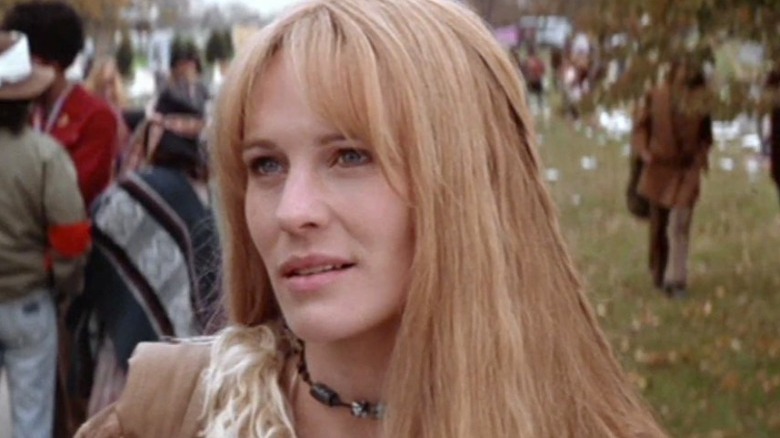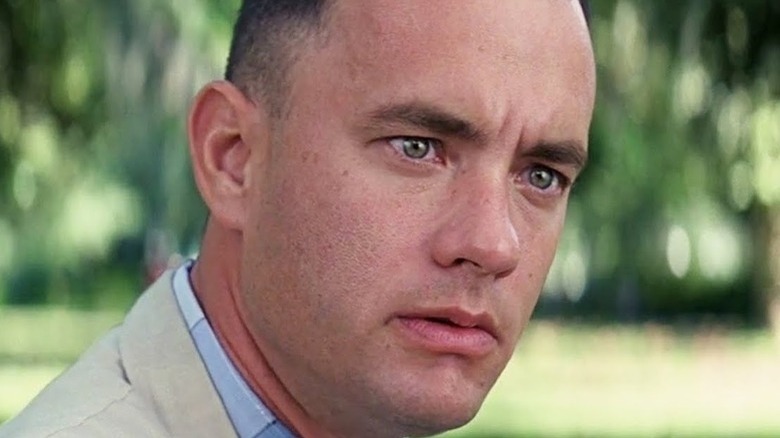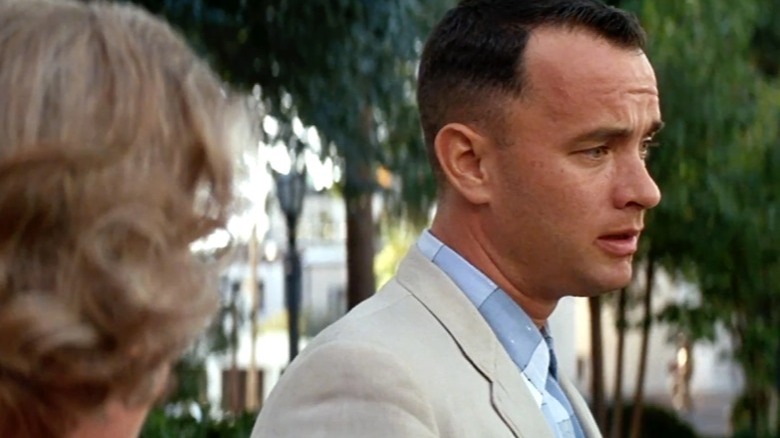The Dark History Of Forrest Gump
Destiny is a fickle thing — and life is like a box of chocolates, or so Forrest Gump's mother has taught him. "Forrest Gump" tackles the very idea of fates intertwined with the random, but natural whims of the world fluttering like feathers in the wind. When countless choices at our disposal can take us down limitless life paths, it's truly difficult to discern whether destiny is a singular pre-ordained path, or a life charted by principles and actions mixed together with seemingly randomized events. Ultimately, Forrest (Tom Hanks) has learned for himself that life is a confluence of destiny and whirlwind of happenstance and chaos that this world often brings.
"Forrest Gump" has often been regarded as a timeless classic. It's the story of a boy who's lacking wit and intellect, but ultimately leads a life that is solely guided by his heart. As such, he manages to have many incredible experiences and finds himself in the middle of some of history's most memorable moments throughout the '50s, '60s, and '70s.
Despite Forrest's many successes in life, he also is intimately familiar with loss and the pain the world can inflict on the human soul. After all, he loses the three most important people in his life — his mother, his childhood love Jenny, and his best friend in the whole world, Bubba. While the film focuses its most overt messages on the whimsy of a grown adult who operates like a child, "Forrest Gump" isn't without the darker themes of sadness, despair, and even hatred. You might ask, in what ways? Well, let's get into it.
Forrest is descended from racists
Forrest Gump is depicted as a happy-go-lucky fellow whose innocence is unmatched by any of the folks who he comes into contact with. Living in the fictional town of Greenbow, Alabama, Forrest was raised by his mother to follow a set of principles often relayed to him as special nuggets of wisdom. Despite the sunny exterior of Forrest's livelihood and upbringing, he has a rather dark family history.
In the opening moments of the film, Forrest narrates his life story as he sits on the bench waiting for the bus. He explains that his mother named him after his ancestor who was a "great" Civil War hero — General Nathan Bedford Forrest. Unwittingly, Forrest continues to speak of the man's unsavory claim to fame as the first Grand Wizard of the Ku Klux Klan. Though, in his complete and total innocence, Forrest recounts the history like the man was simply playing dress up with his friends as ghosts in bed sheets.
While the Civil War general has often been seen as a heroic figure in the South for many decades, Nathan Bedford Forrest is more rightfully regarded by most as a despicable man who was not only known for his extreme prejudice and racism, but also a major war crime (via MSNBC). During the war, he massacred an entire Union regiment who had surrendered, one that included both white and black soldiers. He's not exactly someone anyone should be proud to be named after.
Forrest was under investigation for an unknown crime
In the film, Forrest was never depicted as engaging in illicit or criminal behaviors. However, one detail in the film might make you rethink Forrest's history. Jenny created a scrapbook of Forrest and his running adventure. And there's also a newspaper clipping titled "Investigation Of Gump To Continue In Hometown." While this could be a curious journalist wanting to dig further into the famous cross-country runner, the article shares a different, more accusatory tone. It reads, "Friends of Forrest Gump have been characteristically evasive in their conjecture regarding his actions. 'He never knew what he was doing' said Emilio Sergia. Most people who grew up with him have strong opinions of him. Twelve out of twenty people would say only 'He's an idiot,' as if that should explain everything."
With this subtle detail, the internet has run wild over the years with speculation. One theory (via Screenrant) suggests that it's possible that Forrest lost his fortune. This is signified by the fact that Lieutenant Dan invested Forrest's money in Apple, but the letter from Apple is dated 1975. In reality, Apple, didn't even exist publicly during that year. It was founded in 1976. Therefore, it's alleged that Lieutenant Dan could've defrauded Forrest, but now the titular character is wrapped up in legal troubles.
Another theory (via Cracked) suggests that if Forrest was experiencing legal trouble with regards to his shrimping business, he likely wouldn't fully understand. At one point, Jenny tells him that if he is ever in trouble that he should run away from it. The idea is that, perhaps, his lengthy cross-country run was really the result of his turmoil and confusion stemming from his legal troubles.
The book's author says Jenny died from Hepatitis C
While "Forrest Gump" was based on the novel of the same name written by Winston Groom, you'd be hard-pressed to really draw very many similarities outside of the titular character himself. The film is a loose adaptation and doesn't follow many of the book's most significant plot threads. In fact, Jenny doesn't actually die in the original 1986 novel. However, she does pass away in the author's sequel "Gump & Co." that was released in 1995, one year after the film hit theaters.
At the time of the film's release, many might've assumed that Jenny Curran passed away from the HIV/AIDS epidemic that was just starting to take off following the era of "free love." Aside from her promiscuity, she was also depicted as a drug addict who very likely shared needles with her partners. In the film's final moments, she tells Forrest that she's sick and the disease is relatively unknown. In the sequel book, the author clarifies that her illness is actually Hepatitis C. And she did contract the disease through a stint of drug abuse. Hepatitis C was also not discovered until 1989 (via NIDDK).
The sequel film would've dealt with Forrest Jr. growing up having AIDS
While the author may have confirmed that Jenny's illness was Hepatitis C, it seems the screenwriter for the film, Eric Roth, was planning to head down the path of HIV/AIDS. The 1994 film left that disease that took Jenny's life rather ambiguous. So, despite any clarifications from the creators behind the narrative, audiences could speculate based on the circumstances. However, the idea that Jenny was a casualty of the AIDS epidemic would have raised multiple questions. For starters, wouldn't Forrest also now have AIDS?
There's always the possibility that Jenny contracted the disease after she slept with Forrest — if she continued her drug use before learning that she was pregnant — since the illness is also transferred through shared needles. However, the more surefire result would be that her son also has AIDS which he would've contracted at birth from his mother.
Roth actually confirmed with Yahoo! Entertainment that he wrote the script for the sequel film despite the movie never going into production. The film would, indeed, begin with Forrest coming to terms with the fact that his son has AIDS. Roth described the atmosphere of an era where many people didn't understand the illness saying, "And people wouldn't go to class with him in Florida. We had a funny sequence where they were [desegregation] busing in Florida at the same time, so people were angry about either the busing, or [their] kids having to go to school with the kid who had AIDS. So there was a big conflict." Now, we're not entirely sure how that would've been a "funny sequence" given that it sounds irrepressibly sad for the young boy.
The real dialogue of Forrest's muted speech in Washington D.C.
Like the feather seen in the introduction of the film, Forrest is pulled every which way like being carried in a breeze. In fact, if he wasn't in the right place at the right time, he wouldn't have signed up for the military which ultimately led him to the frontlines of the Vietnam conflict. Later in the film, he is swept into an anti-war rally in Washington D.C. Of course, anti-war protests were in full swing during the era of the Vietnam conflict and organizers of the rally sought to add a veteran's opinion on the war to the event.
After Forrest is pushed into speaking in front of thousands of people, he's prodded along to talk about his experience in combat. Of course, a conniving individual attempts to sabotage the event by messing with the audio equipment. Then, it becomes a mad scramble to fix the equipment while Forrest shares his sentiment. Unfortunately, the audio only returns at the moment Forrest finishes speaking. If you ever wondered what Forrest said or if actual dialogue was spoken, you might be interested to hear that Forrest really did speak on his experiences. Though, his thoughts were mostly focused on the death and destruction of the war as he highlighted the sad moments of losing his friend and seeing his commanding officer badly injured. In his speech, Tom Hanks clarified what he said (via Far Out Magazine). "Sometimes when people go to Vietnam, they go home to their mommas without any legs. Sometimes they don't go home at all. That's a bad thing. That's all I have to say about that."
A sequel film was cancelled due to a national tragedy
"Forrest Gump" was framed as a pretty encapsulated story with an arc that felt resolved near the end. Forrest had seemingly learned that life is mostly what you make of it. For better or worse, he always forged ahead and managed to prove his detractors wrong having lived a life full of experiences while still fairly young. "Stupid is as stupid does," is a phrase he'd share from his momma that ultimately was meant to convey the idea that people are only as brilliant as their actions and the fruits that come from it. So while many might ask Forrest if he's stupid, being the founder of Bubba Gump Shrimp Co. says it all.
While the film coming full circle with Forrest now a parent watching his son come of age feels a bit poetic and entirely resolute, there was a potential for a sequel film. As previously mentioned, a script had been written that explored Forrest's relationship with his son well into the '80s. However, screenwriter Eric Roth explains why the film didn't make it to production. The final draft of the script was filed on September 10, 2001. Roth shared with Yahoo! Entertainment, "Literally, I turned it in the day before 9/11." He continued, "And Tom and I and Bob got together on 9/11 to sort of commiserate about how life was in America and how tragic it was. And we looked at each other and said, 'This movie has no meaning anymore, in that sense.'"
Therefore, work on the film did not proceed as it simply didn't sit well with the creators following that tragic day.
Forrest understood pain despite his innocent appearance
The journey from boyhood to adulthood as a man with a simple view of life actually becomes one of the most winding and complex stories in cinema. Because Forrest isn't worldly nor does he espouse any firm convictions other than his love for the people in his life, he's often caught in the web of a tumultuous world and forced to experience some of the most horrific aspects of it. Many folks in Forrest's hometown of Greenbow, Alabama simply find him to be "stupid." But their perceived lack of mental acuity fails to consider just how emotionally in touch Forrest really is.
Forrest may have felt that looking for some guy named Charlie in the jungles of Vietnam was a strange adventure, but he quickly learned how serious and life-altering the moment would be. Forrest's greatest attachments in life were the things he had very few of — friends. From the moment he stepped on the school bus and was rejected by several kids until the day Forrest would become a successful businessman, he constantly received the judgements of his peers. Even after striking it rich, he never needed anything more than his childhood home and his relationships.
Having a fortune only meant that money was one thing he didn't have to worry about any longer. With that said, Forrest loses the three most important possessions in his life throughout the film: his relationships with his mother, Bubba, and Jenny due to their untimely deaths. By that measure, Forrest understands pain far more than most can possibly imagine.
Some critics see the film as a dark reminder of life's uncaring nature
Like any major film, the narrative and themes are always up for interpretation. "Forrest Gump" might be a heart-warming story on the surface about a boy who simply lives a full life and ultimately receives the karmic deliverance that comes from his good nature. But some have perceived a subtext that might dissuade fans of the film from fully embracing its somewhat fairytale themes in a modern age.
Kyle Smith from National Review writes about the drearier implications of the film's plot and the underlying messages. The observation is that Forrest Gump isn't really any of the things he's perceived to be, such as a war hero or successful businessman. He's often seen as a "yes man" and one who isn't "bright enough to make informed choices" according to Smith. In other words, he truly did believe that he got bit by an animal in the jungles of Vietnam, and his good fortune with the shrimp boat and the Apple shares just fell out of the sky. Everything that he stumbles into is happenstance which forgoes the idea that merit is truly what goes the distance in this world.
Smith states, "The implication is that, whether we're talking about war heroes or entrepreneurs, luck plays a bigger role in life than we like to acknowledge." He continues, "Life isn't a meritocracy; it's a crapshoot. Being pure of heart has nothing to do with Gump's success unless you think God went out of his way to help him by trashing all of his competitors' shrimp boats." Quite a bleak outlook, eh?
Jenny's broken life is a result of childhood abuse
It's hard not to blame Jenny for her own destructive path and the way she treated Forrest. After all, he always seemed to be right there ready to be a friendly ear and be incredibly supportive. But she'd turn that away in favor of booze, drugs and a revolving door of so-called friends who all seemed to be doing the same thing — running from their problems. In essence, Jenny did lay it all out on the table when she told Forrest that if he was ever in trouble, he should just run away as fast as he can. That's exactly what she does, however. Instead of dealing with her problems, she runs and ultimately hopes to forget with the help of strong substances.
Forrest may not have realized it as a young boy, but Jenny was clearly being abused by her father. Forrest's innocent mind couldn't wrap around the idea of something so vile, but Jenny's trauma is the physical and sexual abuse she experienced as a young girl. In an age where mental health care was far from adequate, Jenny never dealt with this trauma in any meaningful way. As such, she lost something most precious: Her sense of self-worth. This would lead her to sabotage any life she could build with Forrest, and was ultimately the reason she lived life on the road attempting to escape her internal struggle.
The director cut a scene where Forrest played with dogs targeting MLK and his supporters
Forrest is known for getting himself entangled in some of history's most crucial moments — some of which had to do with the racial strife the country was enduring at that time. With a film that covers most of the significant events from the '60s and '70s, some might wonder why there was never a reference to the events of the Selma rally or Martin Luther King Jr. It turns out, there was supposed to be a scene involving that very moment in history, but it had been cut from the final product.
The scene involves riot police and German Shepherds being unleashed on the peaceful protestors at the rally. Forrest Gump finds himself in the middle of it all and stops the canines from doing their job because he starts playing with them in the middle of the road. Of course, like everything else, Forrest is completely oblivious to the reality of the situation and apologizes to the protestors for the interruption and says, "Sorry they interrupted your parade. They just dogs. They don't know any better." Director Robert Zemeckis ultimately cut the scene over fears that it may be in poor taste. However, you can catch a glimpse of what could have been on YouTube.
The film is often seen as conservatism trumping liberalism
Some can't simply let a film stand on its own merits as a tale of adventure and humanity. There are those who attempt to uncover the deeper meanings in a narrative in order to engage in discussion. One of the most prominent interpretations of "Forrest Gump" is that it's a film rooted in conservatism. The titular character is a strait-laced man who follows the rules, serves his country, becomes a successful business owner, and is often rewarded for seemingly being who he is. On the other hand, Jenny represents the liberal sect as one who is a free spirit and rebel, yet she suffers for her actions.
Indiewire provides a look at the film 25 years after its release with the statement that it simply feels more egregious in its political undertones despite the film's director and the leading man Tom Hanks claiming otherwise upon its release. In a world that is increasingly divided over politics, perhaps, these traits are far more apparent than they once were in a pre-COVID, pre-Afghan war, and pre-9/11 world.
